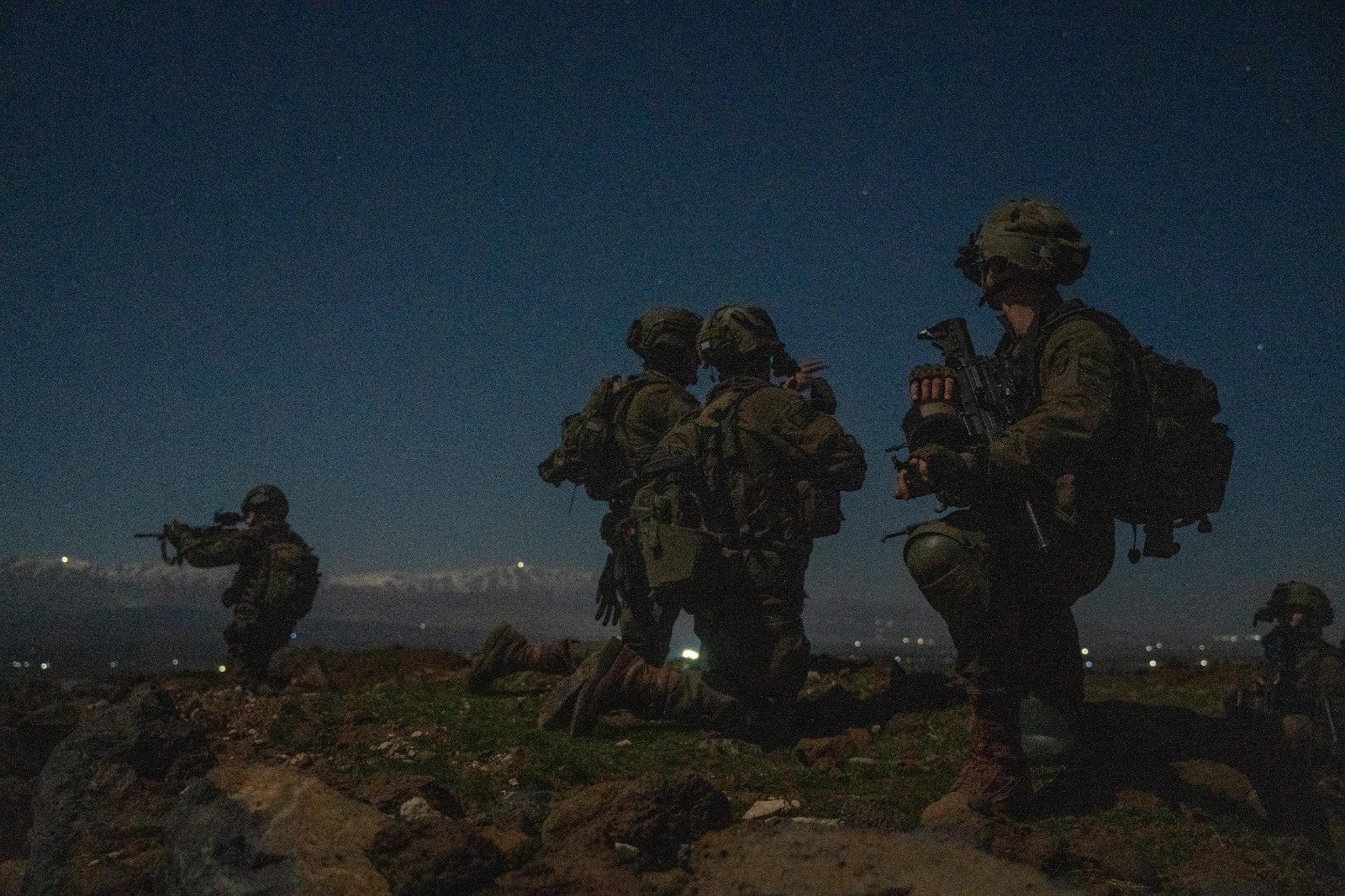They helped overthrow Assad, but potential terrorist ties complicate the community's future in the country.

foreignpolicy.com
Uyghur Fighters in Syria and the Future of the Turkistan Islamic Part…
Umar FarooqApril 4, 2025, 6:00 AM
Masked fighters in camouflage stand in lines holding guns.
Masked fighters in camouflage stand in lines holding guns.
An image released by the Turkistan Islamic Party in Syria shows fighters in formation in Idlib on Sept. 28, 2024. Turkistan Islamic Party in Syria/muhsinlar.net
DAMASCUS—On a recent Friday afternoon at the Umayyad Mosque in Syria’s capital, Uyghur fighters joined thousands of other worshippers for weekly prayers as just another group of rebels in uniform. Since the fall of dictator Bashar al-Assad, Uyghurs have become increasingly visible around Damascus, but their future in the country is tenuous and could prove an obstacle for a new government in Syria seeking to assure global powers that it can keep foreign fighters from threatening those beyond its borders.
Over the last decade or so, thousands of Uyghurs made their way to Syria from China via Turkey. Today, Uyghur leaders in Syria say their community numbers around 15,000, including 5,000 fighters. Most live in the rebel-held city of Idlib or in enclaves near the city of Jisr al-Shughur. The “Turkistanis,” as many Syrians refer to them, have opened schools and operate gas stations and restaurants. At neighborhood bakeries, they churn out traditional round, thick flatbreads, which some of their Syrian neighbors have developed a taste for as well. The vast majority do not have passports, but like others in the rebel-held areas, they have ID cards, and hundreds are enrolled in Idlib University, where the interim government has announced they, like local Syrians, can attend tuition-free.
The interim Syrian government has included them in its official military structure as well, a nod to the role their fighters played in toppling Assad—a war that Uyghur leaders say cost around 1,100 Uyghur lives. In January, hundreds of military commanders dressed in uniform assembled to hear Syrian leader Ahmed al-Sharaa give his first speech since toppling Assad, and among them was Abdulaziz Davud Hudaberdi, an ethnic Uyghur from a village near Aksu in China. Hudaberdi came to Syria in 2012 and leads the local branch of the Turkistan Islamic Party (TIP), a group that most of the Syrian Uyghurs belong to. As the head of the rebels’ 133rd Division, he was instrumental in helping to end the Assad regime and was rewarded with a position as a brigadier general in the Syrian army, along with two other Uyghurs who were appointed colonels. There are about half a dozen foreign fighters who have been given such ranks in the new Syria.
The TIP’s presence in Syria could prove consequential for the future of the country as it looks to have international sanctions against it lifted. Hayat Tahrir al-Sham (HTS), which led the charge against Assad and has since been dissolved and folded into the new government, is listed as a terrorist organization by the United Nations. China has indicated the presence of groups such as the TIP continue to dissuade it from supporting any change in that designation.
Beijing’s views on the TIP, though, run up against concerns about how it treats the Uyghur minority at home, sparked by reports of mass incarceration and allegations of a state-led effort to erase the ethnic group’s religious and cultural distinctiveness. China’s policy in Xinjiang—or East Turkistan, as some Uyghurs refer to it—has garnered the ethnic minority sympathy among Western governments and emboldened some in the Uyghur diaspora to openly call for independence from Beijing, even if that means fighting for it. For the Uyghur diaspora globally, the TIP is the first successful fighting force their cause has had.
“We are proud of them,” said Rukiye Turdush, a Uyghur Canadian academic and former head of the East Turkistanian Federation of Canada. She said the scenes of Syrian prisoners being freed from captivity gave her hope that Uyghurs, kept in prisons and so-called reeducation camps in China by some estimates in the hundreds of thousands, would one day be free as well. “Some people said when they opened the doors of Assad’s prisons, they cried a lot because they felt like they were opening Chinese prisons,” Turdush said.
Like many of the Uyghurs who ended up in Syria, Hudaberdi spent years looking for a place to settle outside China. The 48-year-old was in and out of prison in China through the late 1990s and 2000s. In 2010, he obtained a fake passport and made his way to Malaysia. From there, Hudaberdi traveled to Iran and then Afghanistan, where he linked up with fledgling Uyghur militant groups that struggled to maintain a presence amid U.S. drone strikes in Afghanistan and Pakistani military operations across the border in Waziristan.
Uyghur immigrants who traveled to Afghanistan in the 1990s were given permission to settle there by the Taliban. By 1998, one Uyghur leader there, Hasan Mahsum, had established training camps and launched the East Turkistan Islamic Movement (ETIM). After 2001, China successfully lobbied to have ETIM listed as a terrorist organization by the United States, and the group’s leadership fled to Pakistan’s Waziristan area, where they developed closer ties to al Qaeda. Mahsum was killed in a Pakistani military raid on an al Qaeda base in 2003. His successor, Abdul Haq al-Turkistani, was appointed to al Qaeda’s leadership council in 2005 and managed to survive U.S. drone strikes over the years, but the group was diminished in numbers to the point that the United States delisted it as a terrorist organization in 2020, saying that “there has been no credible evidence that ETIM continues to exist.” Beijing insists the TIP is just the ETIM operating under a different name and that it continues to be affiliated with al Qaeda, attributing a string of incidents in China—from assassinations of pro-government imams to knife attacks—to the group, as well as the 2016 suicide bombing of the Chinese Embassy in Bishkek, Kyrgyzstan.
Sean Roberts, a professor at George Washington University who studies Uyghur populations, says none of these attacks are “clearly attributed” to either the TIP or ETIM. The TIP spokesperson in Syria affirmed that the group was not responsible for these attacks. The spokesperson added that the TIP has no aspirations to launch international terrorist campaigns, as these are counterproductive to the group’s long-term mission to garner global political support, and that it no longer has ties to al Qaeda.
When Hudaberdi moved to Syria in 2012, it was at a time when a stream of Uyghur migrants were making their way there. By some estimates, thousands of young men crossed into rebel-held Syria, chiefly through neighboring Turkey. This was part of a movement that was encouraged in part by the tacit approval of the Turkish government, said Roberts, who conducted extensive interviews with the migrants. In so doing, Turkey was trying to walk a fine line: It already hosted millions of Syrian refugees, but President Recep Tayyip Erdogan also sought to maintain public support for the Uyghur cause to keep nationalists onside.
“A lot of the people who ended up [in Syria] were people who basically had left China to go to Turkey,” Roberts said. “It seems some people within Turkey, potentially some of them with Turkish government approval, suggested they go down to Syria, that there you have to work with this group, you’ll get training with the military, you’ll be able to someday go back and fight for your homeland, and your families will be taken care of.”
The TIP in Syria says its members were drawn to the country looking for a place to settle but that many joined the fight against Assad because it reminded them of tactics deployed against them in China: large-scale spying, indefinite imprisonment, and discrimination based on ethnic and religious beliefs. “The Uyghurs saw parallels between the oppressive regime of Bashar al-Assad and that of the Chinese Communist Party,” the TIP spokesperson said, “and as a result, they joined the fight alongside Syrians.”
In the ensuing years, TIP fighters went on to take part in rebel campaigns in Jisr al-Shughur, Aleppo, Idlib, and Latakia. Hudaberdi lost family members to regime airstrikes, including his wife and two sons. In 2021, he graduated from HTS’s military academy in Idlib, and in late 2024, he led fighters participating in the blitz that saw the rebels eventually reach Damascus.
The chance of the TIP still having links to global jihadi groups has kept some Uyghur diaspora leaders from expressing support for it, Roberts said. Many Uyghur diaspora groups in the West “have shied away from saying the group even exists, claiming [the TIP] is a conspiracy by China to discredit them globally.” Meanwhile, others take the position that “we should be proud to have overthrown Assad, who is a horrible dictator, and this shows if we ever did have a state, we could have a military.”
One such group is the International Union of East Turkistan Organizations, which has been active for nearly two decades in Turkey. The largely conservative umbrella organization is led by Hidayet Oguzhan, an ethnic Uyghur from Kashgar who studied in Pakistan and later settled in Turkey. “The Syrians overthrowing the dictator and murderous Assad regime and taking over the government has been an incredibly great glimmer of hope for us, the people of East Turkistan,” Ogyzhan said in a statement posted on social media.
The future of the TIP in Syria will depend on what kinds of concessions the new government is forced to make to outside powers. Technically, Hudaberdi and the thousands of Uyghur fighters who make up the TIP are now part of the Syrian military. But they still do not have Syrian citizenship. Sharaa, for his part, has said foreign fighters were an integral part of the rebel victory and has mused that providing them with citizenship was something worth looking at. His government has also attempted to assure others that it no longer has global jihadi ambitions.
And while HTS made far more headway than the Taliban have since taking power in Afghanistan, there may be important lessons from that conflict for Syria, said Iftikhar Firdous, the editor of the Khorasan Diary, which monitors jihadi activity in the region. “The HTS takeover of Syria is the second case of a jihadist militant group that has taken control of a full country in this century,” Firdous said. He questioned whether the TIP’s members have been organically integrated into Syria or simply incorporated on paper to assuage global concerns about their presence. In Afghanistan, the Taliban have paid foreign fighters to put aside their global jihadi aspirations, while in Syria, HTS took an equally top-down approach, including the TIP in its military chain of command.
For China, a militant Uyghur presence in neighboring Afghanistan was a bigger threat than one in Syria. That is partly why Beijing has been keen to court the Taliban











www.nytimes.com